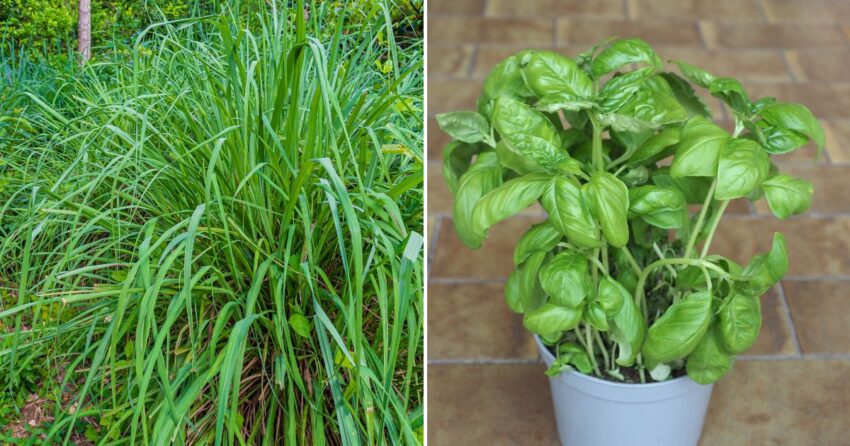Summertime’s great, isn’t it? Long days, warm evenings, barbecues, and, unfortunately, mosquitoes. Those pesky little bloodsuckers can turn a pleasant evening into an itchy nightmare. But fear not, nature has a way to help us out. Some plants naturally repel mosquitoes, making them perfect additions to your garden or patio. On the flip side, there are some plants you might think repel mosquitoes but don’t. Let’s dive into the world of mosquito-repelling and non-repelling plants.
7 Plants That Repel Mosquitoes
1. Citronella (Cymbopogon nardus)
You’ve probably heard of citronella candles, but did you know the actual plant works even better? Citronella grass has a strong lemony scent that mosquitoes despise. Plant it in large pots around your patio or garden, and you’ll notice a significant decrease in mosquito activity.
2. Lavender (Lavandula spp.)
Lavender isn’t just for relaxation. Its pleasant aroma is off-putting to mosquitoes. This hardy plant thrives in sunny areas and well-drained soil, making it a beautiful and practical addition to your outdoor space. Plus, you can use its flowers for homemade sachets and oils.
3. Marigolds (Tagetes spp.)
Marigolds are vibrant flowers that add a pop of color to your garden while keeping mosquitoes at bay. They contain pyrethrum, a compound used in many insect repellents. Plant them in borders or pots near entrances to keep mosquitoes out of your home.
4. Basil (Ocimum basilicum)
Basil isn’t just for pesto. The strong scent of this culinary herb repels mosquitoes. Grow basil in pots near your outdoor seating areas, and as a bonus, you’ll have fresh leaves for cooking. Try different varieties like lemon basil or cinnamon basil for added fragrance and effectiveness.
5. Peppermint (Mentha piperita)
Peppermint’s refreshing scent is delightful to us but detested by mosquitoes. This vigorous plant spreads quickly, so it’s best grown in containers. Use the leaves to make refreshing teas or add them to summer cocktails while enjoying a mosquito-free evening.
6. Rosemary (Rosmarinus officinalis)
Rosemary is a versatile herb that’s great for cooking and mosquito repelling. Its woody scent is something mosquitoes avoid. Plant rosemary in your garden or keep pots of it on your patio. It’s drought-resistant and thrives in full sun, making it a low-maintenance option.
7. Lemon Balm (Melissa officinalis)
Lemon balm, a member of the mint family, has a strong lemon scent that mosquitoes hate. It grows easily and spreads quickly, so it’s best kept in pots to control its spread. Use the leaves to make a calming tea or crush them to release their scent when mosquitoes are around.
4 Plants That Don’t Repel Mosquitoes
1. Geraniums (Pelargonium spp.)
While geraniums are often marketed as mosquito repellents, they’re not particularly effective. Some varieties contain citronella-like scents, but they don’t release enough of it to make a noticeable difference. Enjoy them for their beauty, but don’t rely on them to keep mosquitoes away.
2. Lantana (Lantana camara)
Lantana’s colorful flowers attract pollinators, but they don’t repel mosquitoes. In fact, some studies suggest that certain species of mosquitoes might even be attracted to lantana. They’re great for butterflies and bees, just not for keeping mosquitoes at bay.
3. Catnip (Nepeta cataria)
This might be surprising since catnip contains nepetalactone, a compound that does repel mosquitoes. However, the plant itself doesn’t release enough of this compound into the air to be effective. Catnip essential oil works, but the plant won’t provide the same benefit.
4. Eucalyptus (Eucalyptus spp.)
Eucalyptus oil is a known insect repellent, but the trees themselves don’t offer the same protection. The oil needs to be extracted and applied to be effective. While eucalyptus trees add beauty and shade to your yard, they won’t help with your mosquito problem.
Creating a Mosquito-Free Zone
Incorporating these mosquito-repelling plants into your garden can help reduce mosquito presence, but they’re most effective when combined with other strategies. Here are some tips to create a mosquito-free zone:
- Eliminate Standing Water: Mosquitoes breed in stagnant water. Regularly empty water from plant saucers, bird baths, and other containers.
- Use Natural Repellents: Enhance the mosquito-repelling effect by using essential oils from the effective plants mentioned above. Apply them to your skin or diffuse them outdoors.
- Install Screens and Nets: Protect your home and outdoor seating areas with screens and mosquito nets to create a physical barrier.
- Maintain Your Garden: Keep your garden tidy. Trim bushes, mow the lawn, and remove any debris that could provide hiding spots for mosquitoes.
By combining mosquito-repelling plants with these practical measures, you can enjoy your outdoor space without the constant annoyance of mosquitoes. So, next time you’re planning your garden, consider adding some of these natural repellents to keep those unwanted guests at bay. Happy gardening!

